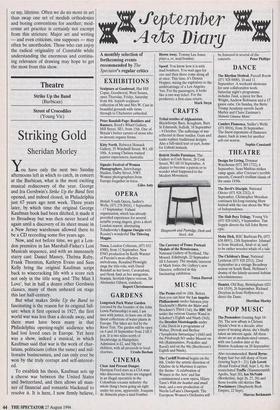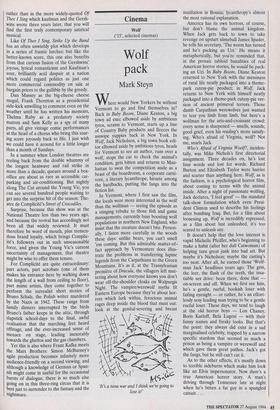Theatre
Strike Up the Band (Barbican) Street of Crocodiles (Young Vic)
Striking Gold
Sheridan Morley
You have only the next two Sunday afternoons left in which to catch, in concert at the Barbican, what is the most exciting musical rediscovery of the year. George and Ira Gershwin's Strike Up the Band first opened, and indeed closed, in Philadelphia just 67 years ago next week. Three years later, by which time the original George Kaufman book had been ditched, it made it to Broadway but was then never heard of again until a discovery of its sheet music in a New Jersey warehouse allowed there to be a CD recording some five years ago.
Now, and not before time, we get a Lon- don premiere in Ian Marshall-Fisher's Lost Musicals sequence, and with an immensely starry cast: Daniel Massey, Thelma Ruby, Frank Thornton, Kathryn Evans and Sam Kelly bring the original Kaufman script back to wisecracking life with a score rich not only in the title song and 'The Man I Love', but in half a dozen other Gershwin classics, many of them unheard on stage this last half-century.
But what makes Strike Up the Band so fascinating is the reason for its original fail- ure: when it first opened in 1927, the first world war was less than a decade away, and there must have been many in that Philadelphia opening-night audience who had lost loved ones in Europe. Yet here was a show, indeed a musical, in which Kaufman said that war is the work of char- latans, politicians (often the same) and mil- lionaire businessmen, and can only ever be won by the truly corrupt and self-interest- ed.
To establish his thesis, Kaufman sets up a cheese war between the United States and Switzerland, and then allows all man- ner of financial and romantic blackmail to resolve it. It is here, I now firmly believe, rather than in the more widely-quoted Of Thee I Sing which kaufman and the Gersh- wins wrote three years later, that you will find the first truly contemporary satirical musical.
Like Of Thee I Sing, Strike Up the Band has an often unwieldy plot which develops in a series of frantic lurches: but like the better-known score, this one also benefits from that curious fusion of the Gershwins' joyous, lyrical romanticism and Kaufman's sour, brilliantly acid despair at a nation which could regard politics as just one more commercial commodity on sale at bargain prices to the gullible by the greedy.
Dan Massey as the big-cheese cheese mogul, Frank Thornton as a presidential side-kick unwilling to comment even on the weather until he has written his memoirs, Thelma Ruby as a predatory society matron and Sam Kelly as a spy of many parts, all give vintage comic performances at the head of a chorus who bring this soar- ing score joyously back to life. I just wish we could have it around for a little longer than a month of Sundays.
In a summer when London theatres are reeling back from the double whammy of the longest heatwave and rail strike in more than a decade, queues around a box- office are about as rare as accessible car- parking and air-conditioning. But nightly along The Cut around the Young Vic, you can see several hundred people waiting to get into the surprise hit of the season: The- atre de Complicite's Street of Crocodiles.
Surprise, because this show was at the National Theatre less than two years ago, and because the revival has accordingly not been all that widely reviewed. It must therefore be word of mouth, plus tremen- dous brand loyalty, which brings Complic- ite's followers out in such unseasonable force, and given the Young Vic's current uncertainty of management, that theatre might be wise to offer them tenure.
For Complicite are quite extraordinary: part actors, part acrobats (one of them makes his entrance here by walking down the length of a wall from ceiling to floor), part mime artists, they come together to perform the surrealist short stories of Bruno Schalz, the Polish writer murdered by the Nazis in 1942. These range from family dinners interrupted by the birds Bruno's father keeps in the attic, through slapstick school-days to the final, awful realisation that the marching feet heard offstage, and the ever-increased sense of menace on stage, leading inexorably towards the ghettos and the gas chambers. Yet this is also where Franz Kafka meets the Marx Brothers: Simon McBurney's agile production becomes infinitely more audience-friendly on a second viewing, and although a knowledge of German or Span- ish might come in useful for the occasional bursts of dialogue, there is so much else going on in this three-ring circus that it is best just to surrender to the fantasy and the nightmare.



























































 Previous page
Previous page